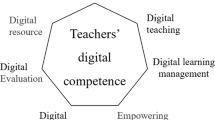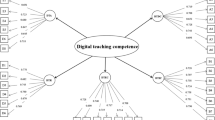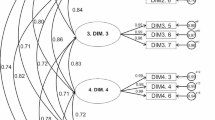Abstract
Teachers’ digital competence is very significant in terms of integrating digital technologies into the education process. This study aims to develop an up-to-date scale that can determine the digital competencies required for teachers to acquire new skills that arise with the change and development of technology and use them in educational environments. A total of 695 teachers participated in the study. Exploratory and confirmatory factor analyses were used to examine the construct validity of the scale. To assess the discrimination index of the items, the lower 27% and upper 27% groups were determined, and the differences between the groups were examined. Internal consistency coefficients were calculated for the reliability analysis. According to the results of the analysis, the developed scale consists of six factors and 46 items, and the Cronbach Alpha coefficient of the entire scale is 0.975. The factors were identified as “Safety,“ “Data Literacy,“ “Problem Solving,“ “Digital Content Creation,“ “Communication and Collaboration,“ and “Ethics,“ respectively, according to the content of the items. When compared with the DigComp 2.1 framework developed by the European Union, it was determined that the ethical factor emerged differently in this study. As a result, it can be said that the Digital Competency Scale for Teachers is a valid and reliable scale that can be used to measure teachers’ digital competencies.


Similar content being viewed by others
Explore related subjects
Discover the latest articles, news and stories from top researchers in related subjects.Data Avaliablity Statement
The data that support the findings of this study are not openly available due to [reasons of sensitivity e.g. human data] and are available from the corresponding author upon reasonable request.
References
Adeyemon, E. (2009). Integrating digital literacies into outreach services for underserved youth populations. Reference Librarian, 50(1), 85–98
Akbulut, Y., Kesim, M., & ve Odabasi, F. (2007). Construct validation of ICT indicators measurement scale (ICTIMS). International Journal of Education and Development using ICT, 3(3), 60–77
Alamutka, K., Punie, Y., & Redecker, C. (2008). Digital competence for Lifelong Learning. Luxemburg: Office for Official Publications of the European Communities. Retrieved August 20, 2010 from http://ftp.jrc.es/EURdoc/JRC48708.TN.pdf
Aytaç, M., & ve Öngen, B. (2012). Doğrulayıcı faktör analizi ile yeni çevresel paradigma ölçeğinin yapı geçerliliğinin incelenmesi. İstatistikçiler Dergisi: İstatistik ve Aktüerya, 5(1), 14–22
Bayrakcı, S. (2020). Dijital Yetkinlikler Bütünü Olarak Dijital Okuryazarlık: Ölçek Geliştirme Çalışması. (Yayın No. 627541) [Doktora Tezi, Marmara Üniversitesi]. Marmara Üniversitesi Sosyal Bilimler Enstitüsü
Bayraktar, R. (2015). Öğretmenlerin eğitim teknolojileri kullanım düzeylerinin belirlenmesi: ölçek geliştirme çalışması. (Yayın No. 407709) [Yüksek Lisans Tezi, Karadeniz Teknik Üniversitesi]. Karadeniz Teknik Üniversitesi Eğitim Bilimleri Enstitüsü
Bejakovic, P., & Mrnjavac, Ž. (2020). The importance of digital literacy on the labour market. Employee Relations: The International Journal, 42(4), 921–932. https://doi.org/10.1108/er-07-2019-0274
Büyüköztürk, Ş. (2002). Faktör analizi: Temel kavramlar ve ölçek geliştirmede kullanımı. Kuram ve Uygulamada Eğitim Yönetimi Dergisi, 8(4), 470–483
Büyüköztürk, Ş., Kılıç Çakmak, E., Akgün, Ö. E., Karadeniz, Ş. ve, & Demirel, F. (2019). Sosyal Bilimler için Veri Analiz El Kitabı (25.Baskı). Ankara: Pegem Akademi Yayıncılık
Caena, F., & Redecker, C. (2019). Aligning teacher competence frameworks to 21st century challenges: The case for the European Digital Competence Framework for Educators (Digcompedu). European Journal of Education, 54(3), 356–369
Carretero, S., Vuorikari, R., & Punie, Y. (2017). The digital competence framework for citizens. Publications Office of the European Union. https://publications.jrc.ec.europa.eu/repository/bitstream/JRC106281/web-digcomp2.1pdf_(online).pdf adresinden 20.09.2020 tarihinde edinilmiştir
Castro-Granados, A., & Artavia-Diaz, K. Y. (2020). Teaching digital skills: an initial approach. Revista Electrónica Calidad en la Educación Superior, 11(1), 47–80. https://doi.org/10.22458/caes.v11i1.2932
Çapık, C. (2014). Geçerlik ve Güvenirlik Çalışmalarında Doğrulayıcı Faktör Analizinin Kullanımı. Anadolu Hemşirelik ve Sağlık Bilimleri Dergisi, 17(3), 196–205
Cihan, O. (2021). Serbest Zaman ve Gündelik Hayat Sosyolojisi Bağlamında “Dijital Huzursuzluk”: İletişimin ve Zamanın Hızına Yetişme Endişesi. Avrasya Uluslararası Araştırmalar Dergisi, 9(28), 104–113
Çoklar, A. N. (2008). Öğretmen adaylarının eğitim teknolojisi standartlarıyla ilgili öz yeterliliklerinin belirlenmesi. (Yayın No. 234361) [Doktora Tezi, Anadolu Üniversitesi]. Anadolu Üniversitesi Eğitim Bilimleri Enstitüsü
Çokluk, Ö., Büyüköztürk, Ş., & Şekercioğlu, G. (2014). Sosyal Bilimler İçin Çok Değişkenli İstatistik: SPSS ve LISREL Uygulamaları. (3.Baskı) Ankara. Pegem Akademi
DeVellis, R. F. (2014). Ölçek geliştirme: Kuram ve uygulamalar. T. Totan (çev.). Ankara: Nobel Akademik Yayıncılık
Field, A. (2013). Discovering statistics using IBM SPSS statistics. (4th Edition). London: Sage, 665–714
George, D., & Mallery, P. (2003). SPSS for Windows Step by Step: A Simple Guide and Reference (4th ed.). Boston: Allyn and Bacon
Gilleard, C., & Higgs, P. (2021). Agents or actants: What technology might make of later life? Socio-gerontechnology, 99–111
Hanell, F. (2018). What is the ‘problem’that digital competence in Swedish teacher education is meant to solve. Nordic Journal of digital literacy, 13(03), 137–151. https://doi.org/10.18261/issn.1891-943x-2018-03-02
Hatlevik, O. E., & Christophersen, K. A. (2013). Digital competence at the beginning of upper secondary school: Identifying factors explaining digital inclusion. Computers & Education, 63, 240–247. https://doi.org/10.1016/j.compedu.2012.11.015
Ilomaki, L., Kantosalo, A., & Lakkala, M. (2011). What is digital competence? http://linked.eun.org/c/document_library/get_file?p_l_id=16319&folderId=22089&name=DLFE-711.pdf
Instefjord, E. J., & Munthe, E. (2017). Educating digitally competent teachers: A study of integration of professional digital competence in teacher education. Teaching and teacher education, 67, 37–45. https://doi.org/10.1016/j.tate.2017.05.016
International Society for Technology Education (ISTE) (2017). ISTE Standards For Educators. https://www.iste.org/standards/for-educators adresinden 23.08.2020 tarihinde ediniliştir
Kalaycı, Ş. (2010). SPSS uygulamalı çok değişkenli istatistik teknikleri. (5.Baskı). Ankara: Asil Yayın Dağıtım
Koehler, M., & Mishra, P. (2009). What is technological pedagogical content knowledge (TPACK). Contemporary issues in technology and teacher education, 9(1), 60–70. https://doi.org/10.1007/978-1-4614-3185-5_9
Kong, S. C., Wang, Y. Q., & Lai, M. (2019). Development and validation of an instrument for measuring digital empowerment of primary school students. In Proceedings of the ACM Conference on Global Computing Education, 172–177. https://doi.org/10.1145/3300115.3309523
Krumsvik, R. (2008). Situated learning and teachers’ digital competence. Education & Information Technologies, 13(4), 279–290
Lawshe, C. H. (1975). A quantitative approach to content validity. Personnel Psychology, 28(4), 563–575
Mannila, L., Nordén, L., & Pears, A. (2018). Digital competence, teacher self-efficacy and training needs. In Proceedings of the 2018 ACM Conference on International Computing Education Research, 78–85. https://doi.org/10.1145/3230977.3230993
Matli, W., & Ngoepe, M. (2020). Capitalizing on digital literacy skills for capacity development of people who are not in education, employment or training in South Africa. African Journal of Science Technology Innovation and Development, 12(2), 129–139. https://doi.org/10.1080/20421338.2019.1624008
McKenzie, J. F., Wood, M. L., Kotecki, J. E., Clark, J. K., & Brey, R. A. (1999). Establishing content validity: Using qualitative and quantitative steps. American Journal of Health Behavior, 23(4), 311–318. https://doi.org/10.5993/AJHB.23.4.9
Mishra, P., & Koehler, M. J. (2006). Technological pedagogical content knowledge: A framework for teacher knowledge. Teachers college record, 108(6), 1017–1054. https://doi.org/10.1111/j.1467-9620.2006.00684.x
Organisation for Economic Co-operation and Development (OECD) (2019). OECD Future Of Educatıon And Skılls 2030. https://www.oecd.org/education/2030-project/teaching-and-learning/learning/ adresinden 25.08.2020 tarihinde edinilmiştir
Pallant, J. (2001). SPSS survival manual (1st ed.). Philadephin: Maidenhead
Pangrazio, L., Godhe, A. L., & Ledesma, A. G. L. (2020). What is digital literacy? A comparative review of publications across three language contexts. E-Learning and Digital Media, 17(6), 442–459. https://doi.org/10.1177/2042753020946291
Pedersen, S., & Liu, M. (2003). Teachers’ beliefs about issues in the implementation of a student-centered learning environment. Educational Technology Research and Development, 51(2), 57–76. https://doi.org/10.1007/bf02504526
Reeves, B., Ram, N., Robinson, T. N., Cummings, J. J., Giles, C. L., Pan, J., & Yeykelis, L. (2021). Screenomics: A framework to capture and analyze personal life experiences and the ways that technology shapes them. Human–Computer Interaction, 36(2), 150–201
Schermelleh-Engel, K., Moosbrugger, H., & Müller, H. (2003). Evaluating the fit of structural equation models: Tests of significance and descriptive goodness-of-fit measures. Methods of psychological research online, 8(2), 23–74
Schreiber, J. B., Nora, A., Stage, F. K., Barlow, E. A., & King, J. (2006). Reporting structural equation modeling and confirmatory factor analysis results: A review. The Journal of educational research, 99(6), 323–338. https://doi.org/10.3200/joer.99.6.323-338
Sönmez, V. (2005). Bilimsel araştırmalarda yapılan yanlışlıklar. Eğitim Araştırmaları Dergisi, 18(1), 150–170
Starkey, L. (2020). A review of research exploring teacher preparation for the digital age. Cambridge Journal of Education, 50(1), 37–56. https://doi.org/10.1080/0305764x.2019.1625867
Statista (2021). Global Digital Population. https://www.statista.com/statistics adresinden 07.11.2021 tarihinde edinilmiştir
Şencan, H. (2005). Sosyal ve davranışsal ölçümlerde güvenilirlik ve geçerlilik. İstanbul: Seçkin Yayıncılık
Tabachnick, B. G., & Fidell, L. S., (2013). Using multivariate statistics (6th Edition). Boston, MA: pearson
Tomte, C. E. (2013). Educating Teachers for the New Millennium? -Teacher training, ICT and digital competence. Nordic Journal of Digital Literacy, 10(Jubileumsnummer), 138–154. https://doi.org/10.18261/issn1891-943x
Tomte, C. E., Enochsson, A. B., Buskqvist, U., & Karstein, A. (2015). Educating online student teachers to master professional digital competence: The TPACK-framework goes online. Computers & Education, 84, 26–35. https://doi.org/10.1016/j.compedu.2015.01.005
Turkish Language Institution (TLI) (2021). Türk Dil Kurumu Sözlükleri. Retrieved from http://sozluk.tdk.gov.tr. on 04.06.2021
United Nations Educational, Scientific and Cultural Organization (UNESCO) (2018). UNESCO ICT Competency Framework for Teachers, https://unesdoc.unesco.org/ark:/48223/pf0000265721 adresinden 23.08.2020 tarihinden edinilmiştir.
We Are Social (WAS) (2021). Digital Around The World İn 2021. https://wearesocial.com/digital-2021 adresinden 07.11.2021 tarihinde edinilmiştir
Worthington, R. L., & Whittaker, T. A. (2006). Scale development research. The counseling psychologist, 34(6), 806–838. https://doi.org/10.1177/0011000006288127
Yaşlıoğlu, M. M. (2017). Sosyal bilimlerde faktör analizi ve geçerlilik: Keşfedici ve doğrulayıcı faktör analizlerinin kullanılması. İstanbul Üniversitesi İşletme Fakültesi Dergisi, 46, 74–85
Yazar, T., & ve Keskin, Ä. (2016). Examination of prospective teachers’ digital competence in the context of lifelong learning. Uluslararası Eğitim Programları ve Öğretim Çalışmaları Dergisi, 6(12), 133–150
Yiğit, N., Bütüner, S., & ve Dertlioğlu, K. (2008). Öğretim amaçlı örütbağ sitesi değerlendirme ölçeği geliştirme. Necatibey Eğitim Fakültesi Elektronik Fen ve Matematik Eğitimi Dergisi, 2(2), 38–51
Author information
Authors and Affiliations
Corresponding author
Ethics declarations
Ethical confirmation
The research was carried out within the framework of the permission numbered 30640013-108.01 of the Social Sciences Ethics Committee of Amasya University.
Conflict of interest
None.
Additional information
Publisher’s Note
Springer Nature remains neutral with regard to jurisdictional claims in published maps and institutional affiliations.
This research study was produced from a part of the first author’s thesis.
Rights and permissions
Springer Nature or its licensor holds exclusive rights to this article under a publishing agreement with the author(s) or other rightsholder(s); author self-archiving of the accepted manuscript version of this article is solely governed by the terms of such publishing agreement and applicable law.
About this article
Cite this article
Gümüş, M.M., Kukul, V. Developing a digital competence scale for teachers: validity and reliability study. Educ Inf Technol 28, 2747–2765 (2023). https://doi.org/10.1007/s10639-022-11213-2
Received:
Accepted:
Published:
Issue Date:
DOI: https://doi.org/10.1007/s10639-022-11213-2




